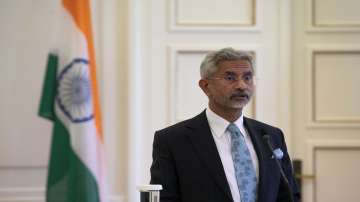Code of Conduct on South China Sea should be consistent with UN convention: EAM S Jaishankar
In a virtual address at a meeting of East Asia Summit, EAM Jaishankar also highlighted the growing convergence of approaches on Indo-Pacific region among different members of the grouping.

India stressed on Wednesday that the Code of Conduct on the South China Sea should be fully consistent with the relevant UN convention and that the negotiations on it should not prejudice the legitimate rights and interests of the nations that are not party to the discussions.
In a virtual address at a meeting of the East Asia Summit (EAS), External Affairs Minister S Jaishankar also highlighted the growing convergence of approaches on the Indo-Pacific region among different members of the grouping.
Separately, Jaishankar also addressed a meeting of the ASEAN-India foreign ministers during which he touched upon a range of issues, including connectivity, and said India is looking forward to an early review of the "trade in goods agreement".
"Stressed that Code of Conduct on South China Sea should be fully consistent with UNCLOS 1982. Should not prejudice legitimate rights and interests of nations not party to discussions," Jaishankar tweeted about his meeting with the foreign ministers of the EAS member countries.
China claims sovereignty over all of the South China Sea, a huge source of hydrocarbons. However, several ASEAN member countries, including Vietnam, the Philippines and Brunei, have counterclaims.
India has been pitching for a rules-based order in the region, including through upholding adherence to international law, especially the UNCLOS (United Nations Convention on the Law of the Sea).
In his address at the EAS meeting, Jaishankar also supported the "ASEAN five-point" consensus on Myanmar and welcomed the appointment of a special envoy.
The external affairs minister also spoke about the growing COVID-19 challenge faced by ASEAN and conveyed India's support and solidarity.
Jaishankar described the discussions at the ASEAN meeting as "substantive and fruitful".
"The broader context, in which we approach our relationship today, as indeed anything else of significance is undeniably that of the COVID-19 crisis. We have noted how ASEAN members have purposefully responded to it, individually and collectively," he said.
"These challenges have also brought ASEAN and India even closer, as we have extended practical support to each other during these times of stress. It is something we can discuss later," Jaishankar added.
He said ASEAN is held up across the world as a good example of successful regionalism, multilateralism and globalisation.
"This year's theme of 'We Care, We Prepare, We Prosper' under the able chairmanship of Brunei succinctly captures the outlook of ASEAN. I am confident that this theme applies equally to our partnership as well," Jaishankar said.
He said the fact that ASEAN-led initiatives have established their salience across so many domains speaks for itself.
"India is committed to supporting a strong, unified and prosperous ASEAN, one whose centrality in the Indo-Pacific is fully appreciated," he said.
"The strong convergence between the ASEAN Outlook on Indo-Pacific (AOIP) and the Indo-Pacific Ocean's Initiative (IPOI) proposed by India adds another dimension to our contemporary partnership," Jaishankar added.
He said India's ties with ASEAN are rooted in history and strengthened by proximity.
"Together, these are factors that can help us achieve a vision of a more 'connected' India and ASEAN. This will naturally require the realisation of a dedicated set of initiatives which, of course, constitute the core of our collaborative agenda," the external affairs minister said.
In a series of tweets, he said much of India's interests and relationships now lie to its east, which is a testimony of its ties with ASEAN (Association of Southeast Asian Nations).
The external affairs minister also emphasised on accelerating connectivity projects and particularly talked about the trilateral highway and Kaladan projects.
The ambitious India-Myanmar-Thailand trilateral highway is expected to boost connectivity among the three countries.
The Kaladan multi-modal transit transport project is being viewed as India's gateway to Southeast Asia.
On the coronavirus pandemic, he said India and ASEAN are "strong partners in Covid response: medicines or oxygen, equipment or logistics".
Jaishankar also proposed 2022 as the ASEAN-India friendship year for the 30th anniversary of the ties between the two sides.
ASEAN is considered as one of the most influential groupings in the region, and India and several other countries including the US, China, Japan and Australia are its dialogue partners.
The ties between India and ASEAN have been on an upswing in the last few years with the focus being on ramping up cooperation in the areas of trade and investment as well as security and defence.
EAS is the premier forum in the Asia-Pacific region to deal with issues relating to security and defence. Since its inception in 2005, it has played a significant role in the strategic, geopolitical and economic evolution of East Asia.
Apart from the 10 ASEAN member states, EAS includes India, China, Japan, the Republic of Korea, Australia, New Zealand, the United States and Russia.